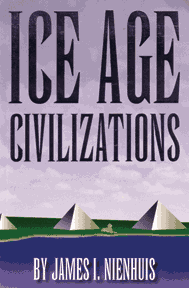This free script provided by
Dynamic Drive
Don't forgot to check ReserveBooks.com reviews and books every day.
We specialize in rare book reviews and avoid the publication of promotional book reviews. To have your book reviewed, mail a copy to us (see contact page).
Custom literature dissertations can be ordered from Dissertation Land thesis company
Essaycamp.com
Please visit our Facebook page!
Reviews - Cook Communication
Ice Age Civilizations, by James I. Nienhuis
 Ice Age Civilizations takes a rigorously independent look at the world of the ancients, abandoning the sacred cows of seemingly peer-impaired academics.
Ice Age Civilizations takes a rigorously independent look at the world of the ancients, abandoning the sacred cows of seemingly peer-impaired academics.
Granted the subject is somewhat dry - for example, Nienhuis goes to extensive pains to debunk current orthodoxy on when the Ice Age occurred, and certainly will convince you the present dates should be changed. (His proof is tangible - known ancient cities that were buried by the sea at known points in time.)
This is a study of ancient civilizations from the viewpoint of physical anthropology, so the remains of civilizations are of paramount importance. And further, the most important skill seems to have been the ability to measure the earth's circumference and chart the precession of celestial orbs. Nienhuis frequently compares civilizations by letting us know which ones understood the precession of stars and planets..
But the interesting sections do not end there, thank God. In fact, speaking of God, Nienhuis is unafraid to acknowledge the cataclysmic Great Deluge and explain beliefs regarding Noah.
We learn that Europe was once covered by ice, and that Stonehenge, in England, was the concern of Hamites and Canaanites (Phoenicians) and Greeks..
Even more enjoyable, we learn about games that have survived from these early civilizations, and find out the role of the celestial mapping skills in their creation: e.g. backgammon, and even - would you believe? - hat sizes!
Perhaps most interesting of all, we learn that the Phoenicians protected their knowledge of star-based navigation by popularizing the view that anyone who ventured too far from home would fall off the edge of the earth. Thus, the Greeks and Romans didn't venture as accurately or as far.
And, thinking of navigation, we learn new meanings for the Celtic Cross, Nienhuis tells us was an important tool of navigation.
So curl up with this book, pretend you are a physical anthropologist, willing to differ with your peers, and enjoy a refreshing quest for the truth about something we will never fully understand.
Bruce Cook, Ph.D.
Publisher, ReserveBooks.com